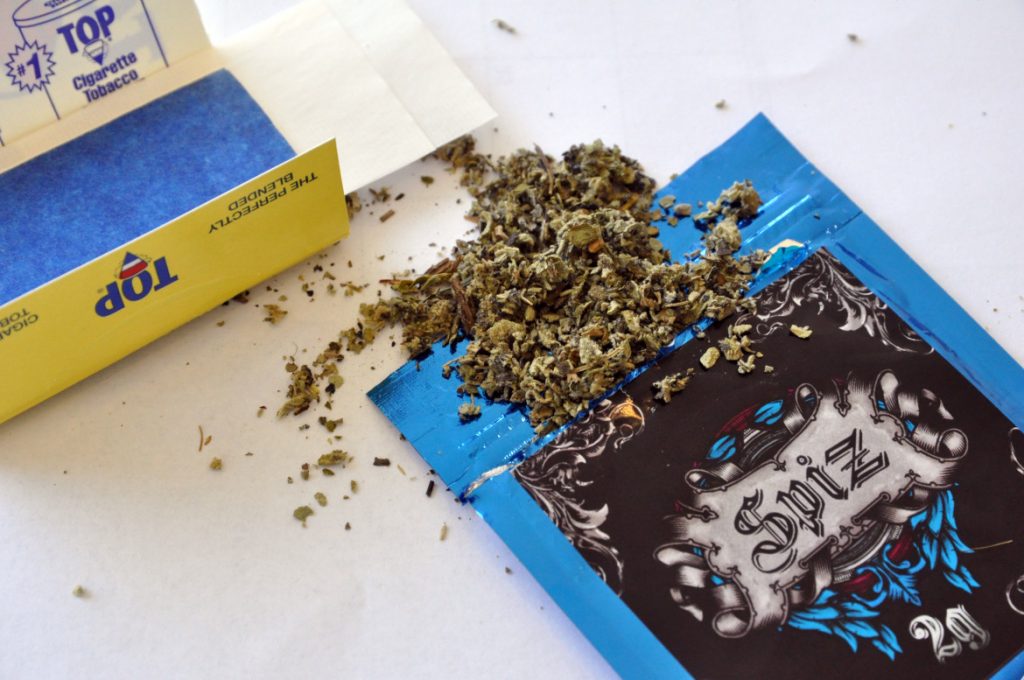‘Spice’ is a growing problem in the UK. Although harm reduction messages are starting to circulate in drug treatment, its unpredictable strength and effects are forcing users in prison to find alternative education methods. Prisons in the UK are a hotspot for this issue and without access to the internet, treatment services or wider peer groups it can be difficult for effective harm reduction advice to be delivered in a custodial setting.
The result of this gap is a practice that takes place in many prisons across the UK, and could be a major factor in the overdoses and deaths that have attracted so much recent media coverage.
Earlier this year I had the opportunity to sit down with someone who had just finished a three-month sentence in Hull prison. He told me that it is common practice for new prisoners to be offered a free joint of Spice under one condition: they must smoke it without overdosing or experiencing any adverse effects. If they do, then they are forced to pay for the joint. The man I spoke too told me that this was a common practice in the prison and that it would be normal for fellow inmates to gather around to see if the newer prisoner could ‘handle it’. When I asked why someone would risk giving Spice away for free the ex-prisoner chuckled and replied, ‘well how else would you find out how strong the Spice is?’
This is, essentially, a harm reduction practice where one user wants to get a feel for the strength of the drug, and does so by using another prisoner as a guinea pig, who is sold on the potentially free drugs. For the new prisoner on the wing this is the perfect opportunity for them to not only get a decent reputation but to ease the trepidation of those first few days inside by consuming Spice.
There is however, a major issue in this method and one which I very much doubt comes into the minds of those partaking in this activity. The impact of the environment is critical in any drug using experience as highlighted by Siegel’s work, and should someone be in an unfamiliar environment their tolerance to any drug is significantly reduced. Siegel’s work explains why many heroin overdoses occur in toilets, drug dealer’s houses or round the back of shops: the unfamiliar environment creates a drop-in tolerance that can quickly lead to overdose. This means that the new prisoner will very often suffer adverse effects and must pay for the Spice, most likely in due to the impact of their new environment which lowers their tolerance to the substance. This gives inaccurate information to the owner of the Spice and significantly increases the likelihood of the new prisoner to experiencing adverse effects after consumption.
Outside of this peer based method of harm reduction, prison staff have next to no accurate drug training relating to Spice and due to the illicit nature of the drug, are certainly not tasked with providing it. The drug is illegal, should not be in prisons and the approach is therefore one of enforcement and restriction. Unfortunately for the prison staff this method of enforcement is not working and Spice remains widely available across all prisons in the UK. Staff not being able to provide effective harm reduction advice thus results in more time being spent dealing with incidents of overdose and misuse.
The initiations that take place, the lack of available education on Spice in prisons and impact of the environment all leads to frequent incidents in which prisoners overdose and suffer sometimes with fatal consequences. It is worth considering how the prisoners’ Spice use might be if they have all the available information to achieve their desired effect. With the right advice and information would prisoners still consume a level of Spice by which they could overdose or are such incidents a by-product of this lack of education?
It is only when you speak to the people using the drug you that the situation starts to make some kind of sense. Those who use Spice in prison want to pass time and escape from a variety of problematic thoughts which they are experiencing. Spice offers a way out from these thoughts and a chance for someone to forget the mundane prison life and experience something different. It offers a way to turn everything off and not have to think about their difficult situations and experiences. It is a new buzz, different from that of normal prison life, far more accessible than cannabis and available in absolute abundance.
The prison system will always have strict rules on the consumption of drugs and the point of entertaining anything else seems thus rather futile. There is however room to educate staff who can then inform prisoners of the facts about Spice: the impact of the environment, the varying strength of the drug and the risks involved in taking part in the initiations of use. The zero-tolerance approach used in prisons is not working or even achievable, I would argue. The safer prisons are, the more effective treatment and rehabilitation will become and less staff time will be spent dealing with Spice related incidents. Just like in life outside of the prison system, illicit drugs have and always will be around. If the system cannot implement measures to prevent the use of Spice then maybe it should instead seek to protect those who use it.
Paul North is an Addiction and Treatment Advisor at Volteface. Tweets @Paul_North


